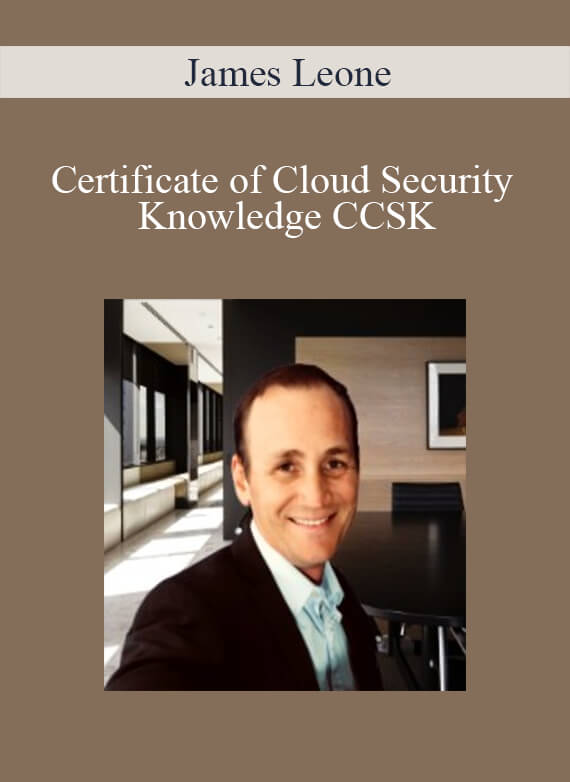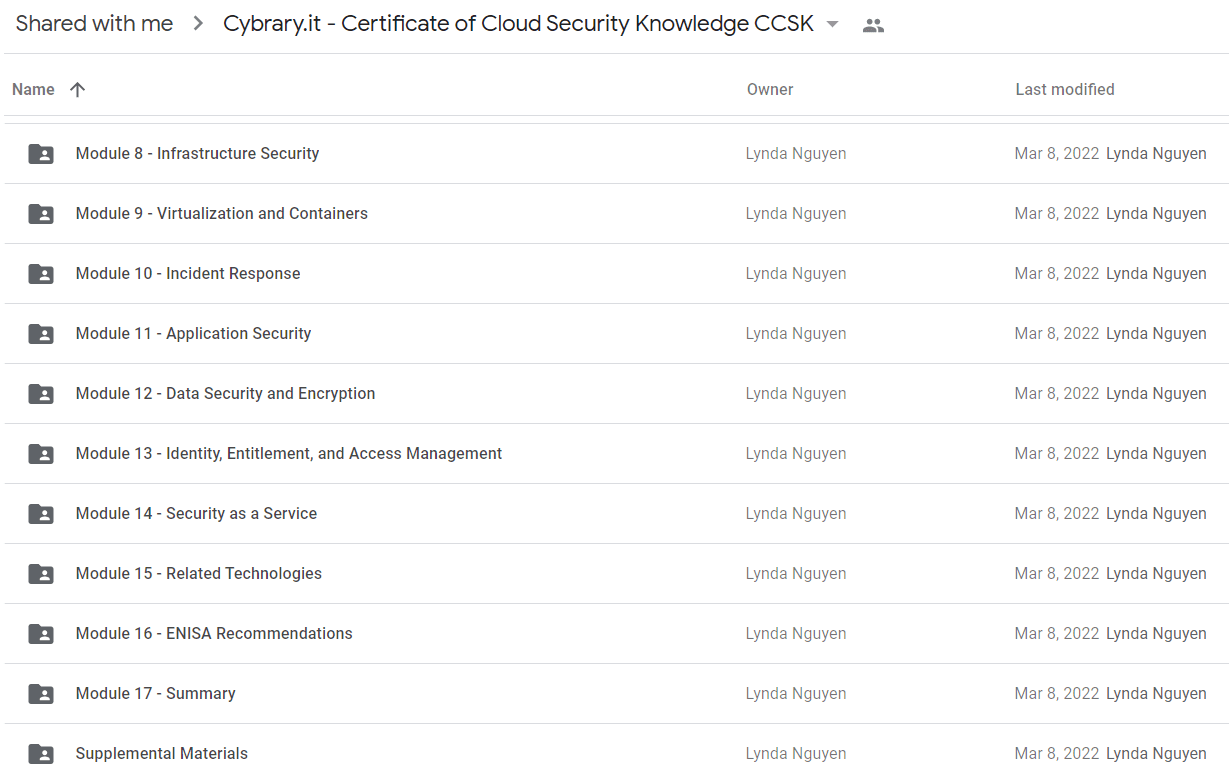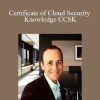James Leone – Certificate of Cloud Security Knowledge CCSK
$395.00 Original price was: $395.00.$75.00Current price is: $75.00.
Instant Download: You will receive a download link via your order email immediately
Should you have any questions, please contact us: [email protected]
 James Leone – Certificate of Cloud Security Knowledge CCSK
James Leone – Certificate of Cloud Security Knowledge CCSK
Course Description
Cloud is currently used throughout the globe by businesses across all industries. The Certificate of Cloud Security Knowledge (CCSK) shows that you have a broad understanding of the security considerations when using cloud-based technologies (regardless of the specific cloud provider or vendor). As a bonus, the CCSK course contains sample questions and pointers to reference material for additional studying.
Prerequisites
The CCSK exam itself does not require any formal experience or pre-requisites. The course materials assume you have a basis in IT technologies, but does not require in-depth technical knowledge of the cloud.
Course Goals
By the end of this course, students should be able to:
- Understand topics covered in the CCSK exam
- Demonstrate competence in cloud security topics
- Identify additional resources to prepare for the CCSK exam and to leverage * in your professional career when working with the cloud
As more companies migrate to the cloud, they need IT professionals who understand the importance of cloud security. The CCSK certification provides students with the foundations necessary to secure data in the cloud and prepares them for the CCSK certification exam.
What is CCSK Certification?
The Certificate of Cloud Security Knowledge (CCSK) is an online exam that validates students’ proficiency in cloud security topics. The certification has been around since its launch in 2010 by the Cloud Security Alliance. It is a widely recognized industry standard of expertise, making it a benchmark for measuring cloud security skills.
The CCSK is a certification that is knowledge-based and doesn’t require any formal work experience. Instead, it is simply recommended that candidates have the knowledge necessary to pass the certification exam. Certificate holders are proven to be ready to take on the challenges of cloud security for any vendor.
Additionally, CCSK certified professionals:
- have the technical abilities, skills, and expertise to develop cloud security environments by maintaining accepted standards
- stand out from noncertified professionals for employment and advancement in the ever-growing cloud job market
- gain access to career resources, like networking, tools, and exchange of ideas with other professionals
What Does the CCSK Training Course Cover?
Our CCSK training course is designed to prepare students to successfully pass the CCSK certification exam and earn their credentials. The CCSK is a vendor-neutral certification, so students will develop a broad understanding of the security of cloud-based technologies. Upon completion of the course, students should have thorough knowledge of the certification exam topics and competency in those same areas.
There are no formal prerequisites for the CCSK certification exam or for this course. However, it is assumed that students have basic IT knowledge before they take this CCSK class.
The course is a total of 9 hours and 29 minutes clock time, for which students will receive 10 CEU/CPE and a Certificate of Completion.
How Hard is the CCSK Certification Exam?
The CCSK exam, like other certification exams, is easier for some students and harder for others. It depends upon how prepared test-takers are and how well they know the material. What’s different about the CCSK certification exam is that it’s web-based, so students can take it from wherever they are, they don’t have to go to a testing center. That means that the exam is essentially an open-book test. However, that doesn’t mean that studying isn’t necessary. The depth of the questions on the exam is high, validating the individual’s practical knowledge for numerous real-time cloud security issues and the best practices to salve them.
The topics that are covered on the CCSK exam include cloud architecture, security compliance, operations, encryption, governance, virtualization, and more. The exam is comprised of 60 multiple choice questions, for which test-takers have 90 minutes to complete. To pass, a score of 80% must be achieved.
The cost of the CCSK certification exam is $345.
Is Earning the CCSK Certification Worth It?
With the current demand for IT professionals of all types, any technology certification can be said to be worth it. The CCSK certification specifically, is worth earning for a number of valid reasons, including:
- It proves proficiency in major cloud security issues through a reputable organization that specializes in cloud research.
- It demonstrates technical abilities, knowledge, and skills to utilize controls that are specific to the cloud.
- It complements other IT credentials like the CISSP, CISA, and CCSP.
- It increases career opportunities and earning potential for certification holders.
In fact, the CCSK credential is one of the highest paying certifications in the IT industry. It was reported in Certification Magazine that the average annual salary for CCSK certified employees was $149,760. With the demand for CCSK professionals and the lucrative salaries, it’s easy to see why earning this certification is definitely worth it.
What’s the Best way to Prepare for the CCSK Certification Exam?
Being properly prepared for the CCSK certification exam is vital. One of the most effective ways to prepare for this certification exam is by taking a CCSK training course that cover all the applicable information and provides students with the opportunity to apply their knowledge in a hands-on environment.
At Cybrary, we provide students with the CCSK course that will help them to become prepared for the certification exam. Students who take the training will learn skills and information that are needed to pass the test and earn their CCSK credential. Enrolling for the course is simple, just click on the Register button in the top right corner of the screen.
Course Content
Module 1: Course Overview
Introduction 5m
Overview 7m
Module 2: Cloud Computing Concepts and Architectures
2.1Cloud Computing Concepts and Architectures 5m
2.2Cloud Computing Benefits 6m
2.3Essential Characteristics 9m
2.4Service Models 7m
2.5Deployment Models 11m
2.6Cloud Security Responsibilities 7m
2.7Domain 1 Knowledge Recap 7m
Module 3: Governance and Enterprise Risk Management
3.1Governance and Enterprise Risk Management 8m
3.2Tools of Cloud Governance 7m
3.3ERM and Impacts of Cloud Model 14m
3.4CCM, CAIQ and STAR 12m
3.5Tradeoffs and Assessment 4m
3.6Domain 2 Knowledge Recap 5m
Module 4: Legal Issues, Contracts and Electronic Discovery
4.1Legal Issues, Contracts and Electronic Discovery 9m
4.2Regional Privacy Laws 8m
4.3Contracts and Provider Selection 7m
4.4Electronic Discovery 6m
4.5Domain 3 Knowledge Recap 5m
Module 5: Compliance and Audit Management
5.1Compliance and Audit Management 8m
5.2Audit Management and Standards 7m
5.3Domain 4 Knowledge Recap 3m
Module 6: Information Governance
6.1Information Governance 11m
6.2Data Security Lifecycle 6m
6.3Domain 5 Knowledge Recap 4m
Module 7: Management Plane and Business Continuity
7.1Management Plane and Business Continuity 9m
7.2Business Continuity Part 1 8m
7.3Business Continuity Part 2 10m
7.4Domain 6 Knowledge Recap 4m
Module 8: Infrastructure Security
8.1Infrastructure Security 7m
8.2Software Defined Network 8m
8.3Virtual Appliances 4m
8.4SDN Security Benefits 4m
8.5Microsegmentation and SDP’s 4m
8.6Hybrid Cloud and Shared Responsibilities 3m
8.7Compute Technologies 5m
8.8Immutable Workloads 5m
8.9Cloud Workload Security 4m
8.10Domain 7 Knowledge Recap 4m
Module 9: Virtualization and Containers
9.1Virtualization and Containers 3m
9.2Virtualized Compute 4m
9.3Virtualized Networking 4m
9.4Virtualized Storage 4m
9.5Containers 6m
9.6Domain 8 Knowledge Recap 5m
Module 10: Incident Response
10.1Incident Response 3m
10.2Preparation 6m
10.3Detection and Analysis 3m
10.4Containment, Eradication and Recovery 4m
10.5Post Incident Activity 2m
10.6Domain 9 Knowledge Recap 3m
Module 11: Application Security
11.1Application Security 4m
11.2Challenges 2m
11.3Secure SDLC 3m
11.4Secure Design and Development 5m
11.5Secure Deployment Part 1 6m
11.6Secure Deployment Part 2 5m
11.7Secure Operations and Architecture 5m
11.8DevOps 4m
11.9Domain 10 Knowledge Recap 2m
Module 12: Data Security and Encryption
12.1Data Security and Encryption 4m
12.2Managing Data Migrations 6m
12.3Securing Data in the Cloud 5m
12.4IaaS, PaaS and SaaS Encryption 6m
12.5Key Management 6m
12.6Architecture, Monitoring and Additional Controls 8m
12.7Domain 11 Knowledge Recap 6m
Module 13: Identity, Entitlement, and Access Management
13.1Identity, Entitlement and Access Management 6m
13.2IAM Standards for Cloud 7m
13.3Managing Identities in the Cloud 11m
13.4Authentication and Credentials 6m
13.5Entitlement and Access Management 8m
13.6Domain 12 Knowledge Recap 4m
Module 14: Security as a Service
14.1Security as a Service 2m
14.2Benefits and Concerns 7m
14.3Major Categories 9m
14.4Domain 13 Knowledge Recap 3m
Module 15: Related Technologies
15.1Related Technologies 9m
15.2IoT and Mobile 6m
15.3Domain 14 Knowledge Recap 3m
Module 16: ENISA Recommendations
16.1ENISA Recommendations 4m
16.2Risks and Legal Issues 10m
Module 17: Summary
17.1Course Summary 4m
17.2Infrastructure Security for Cloud 9m
17.3Managing Cloud Security and Risk 4m
17.4Data Security for Cloud 3m
17.5Securing Cloud Applications, Users and Related Technologies 4m
17.6Cloud Security Operations 3m
17.7Register and Prepare 6m
Module 18: Course Assessment
18.1CCSK Course AssessmentASSESSMENT 30m






Reviews
There are no reviews yet.